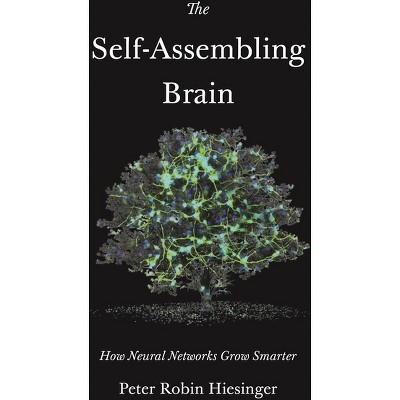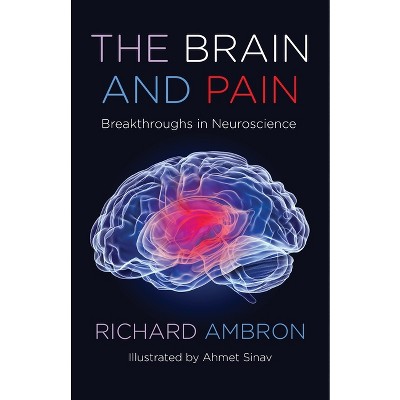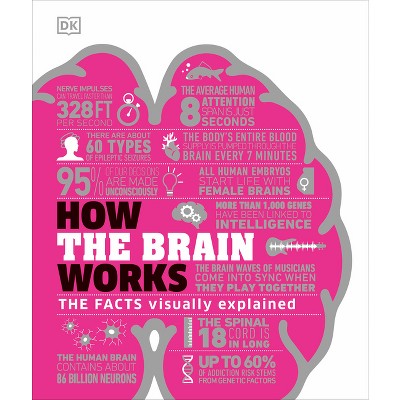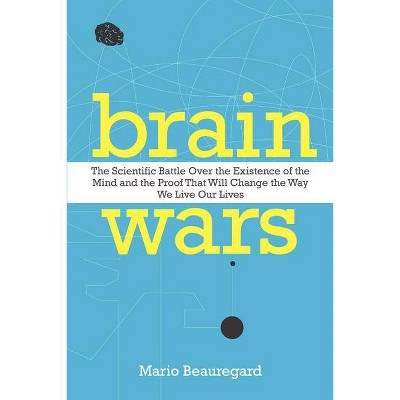Sponsored

Reductionism in Art and Brain Science - by Eric Kandel (Paperback)
In Stock
Sponsored
About this item
Highlights
- Are art and science separated by an unbridgeable divide?
- About the Author: Eric R. Kandel is University Professor and Kavli Professor in the Departments of Neuroscience, Biochemistry and Molecular Biophysics, and Psychiatry at Columbia University.
- 240 Pages
- Science, Life Sciences
Description
About the Book
The Nobel Prize-winning neuroscientist Eric R. Kandel shows how science can inform the way we experience a work of art and seek to understand its meaning. He illustrates how reductionism--distillation of larger scientific or aesthetic concepts into smaller components--has been used by scientists and artists alike to pursue their respective truths.Book Synopsis
Are art and science separated by an unbridgeable divide? Can they find common ground? In this new book, neuroscientist Eric R. Kandel, whose remarkable scientific career and deep interest in art give him a unique perspective, demonstrates how science can inform the way we experience a work of art and seek to understand its meaning. Kandel illustrates how reductionism--the distillation of larger scientific or aesthetic concepts into smaller, more tractable components--has been used by scientists and artists alike to pursue their respective truths. He draws on his Nobel Prize-winning work revealing the neurobiological underpinnings of learning and memory in sea slugs to shed light on the complex workings of the mental processes of higher animals.
In Reductionism in Art and Brain Science, Kandel shows how this radically reductionist approach, applied to the most complex puzzle of our time--the brain--has been employed by modern artists who distill their subjective world into color, form, and light. Kandel demonstrates through bottom-up sensory and top-down cognitive functions how science can explore the complexities of human perception and help us to perceive, appreciate, and understand great works of art. At the heart of the book is an elegant elucidation of the contribution of reductionism to the evolution of modern art and its role in a monumental shift in artistic perspective. Reductionism steered the transition from figurative art to the first explorations of abstract art reflected in the works of Turner, Monet, Kandinsky, Schoenberg, and Mondrian. Kandel explains how, in the postwar era, Pollock, de Kooning, Rothko, Louis, Turrell, and Flavin used a reductionist approach to arrive at their abstract expressionism and how Katz, Warhol, Close, and Sandback built upon the advances of the New York School to reimagine figurative and minimal art. Featuring captivating drawings of the brain alongside full-color reproductions of modern art masterpieces, this book draws out the common concerns of science and art and how they illuminate each other.Review Quotes
[An] intriguing treatise.-- "Nature"
[A] fascinating survey of mind science and modern art.... Kandel presents concepts to ponder that may open new avenues of art making and neuroscientific endeavor.-- "Publishers Weekly"
[Eric Kandel's] new book offers one of the freshest insights into art history in many years.-- "Salon"
A pleasure to read-- "FASEB Journal"
Elegant and entertaining.-- "Wall Street Journal"
Kandel makes an important contribution with this book; he lucidly describes the very active interplay across disciplines that has taken place with regard to exploring how information is managed and understood, and then related across artistic mediums, scientific research, and socially, through sharing of ideas and findings.-- "PsycCritiques"
Kandel's theory of how are our neurons fire in response to abstract art is illuminating. . . . One looks forward to hearing more from Kandel, a most inventive scholar, now that his bridge has been solidly built.-- "The New Criterion"
Recommended for those interested in the intersection of psychology and art.-- "Library Journal"
The effort to complete this book will be well rewarded.... C.P. Snow would be proud.-- "Neurology Today"
The result is an intriguing, thought provoking book which will appeal to those with pre-existing knowledge but also to those who may be unfamiliar but curious.--Megan Kenny, University of Huddersfield "The British Society for Literature and Science"
Unique and thought-provoking.-- "Times Higher Education"
Aiming to lessen the gap between the cultures of art and science, Kandel forwards new ways of considering abstract art through the model of reductionism: less is more when it comes to stimulating the brain's creative abilities and our aesthetic responses.--Emily Braun, Distinguished Professor of Art History, Hunter College and the Graduate Center, CUNY
Eric Kandel's new book, Reductionism in Art and Brain Science is a beautiful integration of visual art and neuroscience. The book engages C.P. Snow's theme of two cultures- the humanities and the sciences- and provides an artful window into the science of the mind through his fourteen nicely written chapters that include elegant figures in visual art and neuroscience. While the book de-mythologizes the idea of reductionism, it also importantly provides a sense for knowing an object and the objects to be known. This is a must read for both neuroscientists and anyone interested in the visual arts and humanities.--Jay Schulkin, Georgetown University
Eric R. Kandel seamlessly moves between the intricacies of science and art, weaving their histories into a common narrative that illuminates both fields and shows they have more in common than is often assumed. It is a fun and informative read that anyone with a curious mind can enjoy and learn from.--Joseph LeDoux, author of Anxious: Using the Brain to Understand and Treat Fear and Anxiety
In this engaging and brilliant exploration, Kandel illuminates the beauty and power of both abstract art and the brain and mind that unravels it. It is a bold and exciting story about the modern revolution in art and brain science that bridges the traditional chasm between the culture of the arts and sciences and helps us understand and experience the most challenging art with the depth it deserves and the joy it enables.--Walter Mischel, author of The Marshmallow Test
Kandel's book, with one foot in the humanities and one foot in the sciences, stands comfortably in both. Writing in deceptively simple prose, not unlike the art he writes about, Kandel lucidly states the biological case for how abstract art challenges us to look so that we can see.--Jim Coddington, chief conservator, Museum of Modern Art
Words like 'genius' or 'renaissance man' are rarely used in these egalitarian times, but such descriptions wouldn't be entirely inappropriate for Kandel, who is renowned for his work on memory. He has now written a remarkable book full of poetic insights without compromising scientific rigor.--V. S. Ramachandran, author of The Tell-Tale Brain: A Neuroscientist's Quest for What Makes Us Human
About the Author
Eric R. Kandel is University Professor and Kavli Professor in the Departments of Neuroscience, Biochemistry and Molecular Biophysics, and Psychiatry at Columbia University. He is director of the Kavli Institute for Brain Science and codirector of the Mortimer B. Zuckerman Mind Brain Behavior Institute at Columbia. In 2000, he was awarded the Nobel Prize in Physiology or Medicine. His recent books include The Age of Insight: The Quest to Understand the Unconscious in Art, Mind, and Brain, from Vienna 1900 to the Present (2012) and In Search of Memory: The Emergence of a New Science of Mind (2007), as well as Principles of Neural Science (2012), of which he is lead coauthor.










